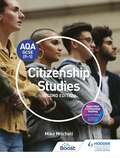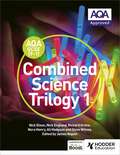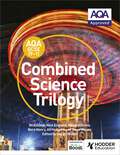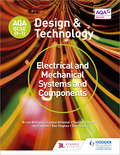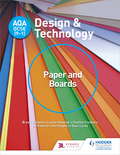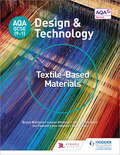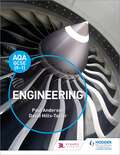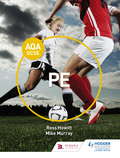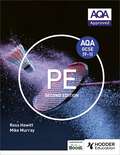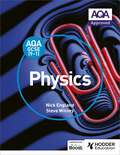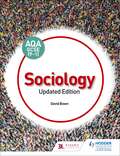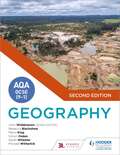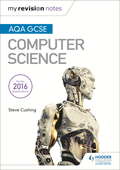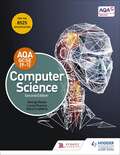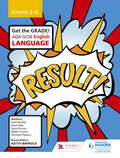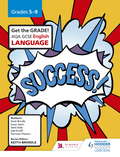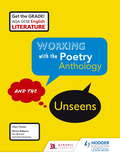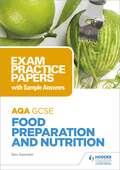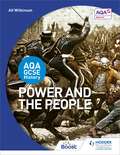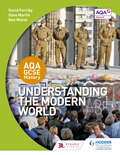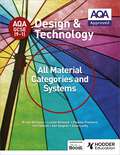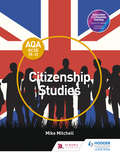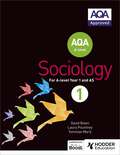- Table View
- List View
AQA GCSE (9-1) Citizenship Studies Second Edition
by Mike MitchellEncourage students to take an active role in citizenship with fully updated content that will allow them to understand the key issues and concepts they need to know using clear, detailed explanations of key terms, supported by real-life case studies that will bring the topic to life. This book contains:- Extensive coverage of tricky topics so students can avoid common mistakes - Up-to-date case studies covering all recent developments relevant to the course - Activities and discussion points, review questions and learning points that teach students the research, analytical, interpretative and evaluative skills required - Fully revised exam-style questions throughout the book, as well as assessment guidance and useful advice on writing exam answers - Links to relevant websites to allow further subject enrichment
AQA GCSE (9-1) Combined Science Trilogy Student Book 1
by Nick England Nora Henry Nick Dixon Richard Grime Steve Witney Ali HodgsonExam Board: AQALevel: GCSESubject: ScienceFirst Teaching: September 2016First Exam: June 2018AQA approved.Build your students' scientific thinking, analysis and evaluation with this textbook that leads them seamlessly from basic concepts to more complicated theories, with topical examples, practical activities and mathematical support throughout.Developed specifically for the 2016 AQA GCSE Combined Science Trilogy specification.-Builds experimental, analytical and evaluation skills with activities that introduce the 16 required practicals, along with extra Working Scientifically tasks for broader learning-Provides plenty of opportunity for students to apply their knowledge and understanding with Test Yourself questions, Show You Can challenges, Chapter review questions and synoptic practice questions-Supports Foundation and Higher tier students in one book, with Higher tier-only content clearly marked.Book 1 covers the topics in Biology Paper 1, Chemistry Paper 1 and Physics Paper 1FREE GCSE SCIENCE TEACHER GUIDESThese will be provided for free via our website. Biology will be available in OctoberChemistry will be available in JanuaryPhysics will be available in MarchTo request your free copies please email science@hodder.co.uk
AQA GCSE (9-1) Combined Science Trilogy Student Book 1
by Nick England Nick Dixon Richard GrimeAQA approved.Build your students' scientific thinking, analysis and evaluation with this textbook that leads them seamlessly from basic concepts to more complicated theories, with topical examples, practical activities and mathematical support throughout.Developed specifically for the 2016 AQA GCSE Combined Science Trilogy specification.-Builds experimental, analytical and evaluation skills with activities that introduce the 16 required practicals, along with extra Working Scientifically tasks for broader learning-Provides plenty of opportunity for students to apply their knowledge and understanding with Test Yourself questions, Show You Can challenges, Chapter review questions and synoptic practice questions-Supports Foundation and Higher tier students in one book, with Higher tier-only content clearly marked.Book 1 covers the topics in Biology Paper 1, Chemistry Paper 1 and Physics Paper 1
AQA GCSE (9-1) Design and Technology: Electrical and Mechanical Systems and Components
by Bryan Williams Louise Attwood Pauline TreuherzBuild in-depth understanding and inspire your students to tackle design challenges both practically and creatively, with a textbook that delivers the Core Technical plus Specialist Technical and Design & Making Principles needed for the 2017 AQA D&T GCSE.The insight of our author team will build topic knowledge, including the technical principles of materials with which you are less familiar, while focusing on the specialist principles of electrical and mechanical systems and components in more depth, to ensure you can navigate the specification with confidence whilst your students' ideas flourish.· Trusted author team of specialist teachers and those with examining experience· Build topic knowledge with learning objectives directly linked to the specification and short activities to reinforce understanding· Develop mathematical and scientific knowledge and understanding with activities that link topics to maths and science· Inspire your students as they undertake the iterative design process, with examples of imaginative design-and-make tasks, and a look at how to approach the Non-Exam Assessment· Check knowledge and understanding with end of topic summaries and practice questions for the written exam
AQA GCSE (9-1) Design and Technology: Paper and Boards
by Bryan Williams Louise Attwood Pauline TreuherzBuild in-depth understanding and inspire your students to tackle design challenges both practically and creatively, with a textbook that delivers the Core Technical plus Specialist Technical and Design & Making Principles needed for the 2017 AQA D&T GCSE.The insight of our author team will build topic knowledge, including the technical principles of materials with which you are less familiar, while focusing on the specialist principles of paper and boards in more depth, to ensure you can navigate the specification with confidence whilst your students' ideas flourish.· Trusted author team of specialist teachers and those with examining experience· Build topic knowledge with learning objectives directly linked to the specification and short activities to reinforce understanding· Develop mathematical and scientific knowledge and understanding with activities that link topics to maths and science· Inspire your students as they undertake the iterative design process, with examples of imaginative design-and-make tasks, and a look at how to approach the Non-Exam Assessment· Check knowledge and understanding with end of topic summaries and practice questions for the written exam
AQA GCSE (9-1) Design and Technology: Textile-Based Materials
by Bryan Williams Louise Attwood Pauline TreuherzBuild in-depth understanding and inspire your students to tackle design challenges both practically and creatively, with a textbook that delivers the Core Technical plus Specialist Technical and Design & Making Principles needed for the 2017 AQA D&T GCSE.The insight of our author team will build topic knowledge, including the technical principles of materials with which you are less familiar, while focusing on the specialist principles of textile-based materials in more depth, to ensure you can navigate the specification with confidence whilst your students' ideas flourish.· Trusted author team of specialist teachers and those with examining experience· Build topic knowledge with learning objectives directly linked to the specification and short activities to reinforce understanding· Develop mathematical and scientific knowledge and understanding with activities that link topics to maths and science· Inspire your students as they undertake the iterative design process, with examples of imaginative design-and-make tasks, and a look at how to approach the Non-Exam Assessment· Check knowledge and understanding with end of topic summaries and practice questions for the written exam
AQA GCSE (9-1) Engineering: Aqa Gcse (9-1) Engineering Epub
by Paul Anderson Mark Griffiths David Hills-TaylorBuild a foundation of knowledge alongside practical engineering skills for the 2017 AQA GCSE (9-1) Engineering specification, inspiring your students' problem solving skills for the NEA and beyond.This accessible textbook sets out clear learning objectives for each topic, with activities to reinforce understanding and examples that will support all students with the maths and science skills needed.- Builds knowledge of materials, manufacturing processes, systems, testing and investigation methods and modern technologies- Helps students to apply practical engineering skills to design and make imaginative prototypes that solve real and relevant engineering problems- Develops mathematical understanding with clear worked examples for all equations and maths skills and questions to test knowledge- Includes guidance on how to approach the non-exam assessment (NEA) with creativity and imagination- Prepares for the written exam with advice, tips and practice questions
AQA GCSE (9-1) PE
by Mike Murray Ross HowittInspire, motivate and give confidence to your students with AQA PE for GCSE. This reliable and accessible textbook is structured to match the specification exactly and will provide your students with the knowledge they need, while giving them the opportunity to build skills through appropriate activities.Features will include:- Key questions to direct thinking and help students focus on the key points- Summaries to aid revision and help all students access the main points - Diagrams to aid understanding- Attractive layout for a truly accessible textbook- Definition of key terms - again to aid and consolidate understanding of technical vocabulary and concepts- Activities to build conceptual understanding and sound knowledge and understanding, analysis, evaluation and application skills.
AQA GCSE (9-1) PE Second Edition
by Mike Murray Ross HowittWritten by leading PE specialists, students will be guided through the AQA GCSE (9-1) PE specification topic by topic and have opportunity to improve their understanding, analysis, evaluation and application skills through exam-style questions and detailed insight to the NEA.Approved by AQA, this Student Book:- develops understanding with thorough coverage of topics and contains summaries, diagrams and key questions to direct thinking and aid revision- provides clear definitions of key terms, technical vocabulary and concepts, including those that students have struggled the most- builds sound knowledge and analysis, evaluation and application skills through detailed support and exam-style questions- stretches, challenges and encourages independent thinking and a deeper understanding through activities, stimulus material and suggestions for further reading.
AQA GCSE (9-1) Physics Student Book
by Nick England Steve WitneyAQA approved.Apply and develop your students' knowledge and understanding of Physics with this textbook that builds mathematical skills, provides practical assessment guidance and supports all the required practicals.- Provides support for all the required practicals with activities that introduce practical work and other experimental investigations in Physics- Builds understanding and knowledge with a variety of questions to engage and challenge: Test Yourself questions, Show You Can challenges, Chapter review questions and synoptic practice questions- Supports Foundation and Higher tier students in one book, with Higher tier-only content clearly marked- Builds Literacy skills for the new specification with key words highlighted and practice extended answer writing and spelling/vocabulary tests
AQA GCSE (9-1) Sociology, Updated Edition
by David BownFully revised and updated, AQA GCSE (9-1) Sociology will guide your students, topic-by-topic, through the 2017 specification, with features specially designed to be accessible to all students so they can:- ensure they have understood each topic and grasped key points with Content Summaries and Check your understanding questions- consolidate their knowledge with activities and extension opportunities to take them beyond the text- define and use key terms in the specification with confidence- use Research in Action sections to understand the work of key sociologists- prepare for assessments with Practice Questions based on the 2017 specification, together with answer guidance and commentaryAQA GCSE (9-1) Sociology has been reviewed by Sociology academics to ensure all content is accurate, sensitive, contextualised and evidence-based.
AQA GCSE (9–1) Geography Second Edition
by Sarah Wheeler Simon Oakes Michael Witherick John Widdowson Rebecca Blackshaw Meryl KingExam board: AQALevel: GCSESubject: GeographyEquip your students for AQA GCSE (9-1) Geography with our fully revised second edition Student Book. Our expert author team, John Widdowson, Rebecca Blackshaw, Meryl King, Sarah Wheeler, Simon Oakes and Michael Witherick bring you revised case studies and examples, as well as a wealth of new practice questions to help your students apply their knowledge to succeed at GCSE.- Enables students to learn and practice geographical, mathematical and statistical skills through engaging activities specifically designed for the 2016 curriculum- Develops students' skills responding to a range of questions with topic-specific Question Practice in each section, supplemented by practical insight from skilled teachers with examining experience- Incorporates possible fieldwork enquiries throughout with expert advice on the fieldwork assessment from authors specialising in this key area- Reduces your research time using the up to date contemporary case studies featuring UK and international examples- Features new examples and fully up-to-date statistics and examples, equipping you to teach a thoroughly contemporary course
AQA GCSE Computer Science My Revision Notes 2e
by Steve CushingManage your own revision with step-by-step support from experienced teacher and examiner Steve Cushing. Use specific case studies to improve your knowledge of Computer Science. Apply terms accurately with the help of definitions and key words.-Plan and pace your revision with the revision planner-Use the expert tips to clarify key points-Avoid making typical mistakes with key expert advice-Test yourself with end-of-topic questions and answers and tick off each topic as you complete it-Get exam ready with last minute quick quizzes at www.hoddereducation.co.uk/myrevisionnotes
AQA GCSE Computer Science, Second Edition
by George Rouse Gavin Craddock Lorne PearceyUpdated specification; first teaching September 2020. Specification code: 8525Written by leading Computer Science teachers, this textbook will guide students through the updated AQA GCSE Computer Science specification topic by topic, and provide them with standalone recap and review sections, practice questions, worked examples and clear explanations of complex topics.This textbook:>> Prepares students for assessment with numerous practice questions for all topics>> Develops computational thinking skills>> Provides differentiated material with the 'beyond the spec' feature>> Includes standalone recap and review sections at the end of each chapter>> Provides definitions of technical terms, along with a glossary of words to ensure students feel confident with the assessment.AuthorsGeorge Rouse, Lorne Pearcey and Gavin Craddock are highly respected and widely published authors of resources.
AQA GCSE English Language Grades 1-5 Student's Book
by Hachette UkAQA GCSE English Language delivers more support in understanding and preparing for the new question types and exam-paper structure than any other course, coaching your students to their all-important Grade 5. - Developed by an author team with unparalleled experience in teaching, examining and delivering student progression - Target your teaching with this Grade 1-5 Student's Book; supports the content and exam skills students' need, using accessible, less-daunting texts - Provides extra support for breaking down and accessing the questions - Deliver higher levels of improvement and lift student performance by tackling each section of the exam papers in detail helping students reach their potential - Support students' progression through the grades with annotated responses and student-friendly mark schemes - Build students' confidence and ensure readiness for exam conditions with mock exam papers, examination tips and question practice We will not be submitting these resources to AQA for approval. Instead, our author team of senior examiners and teachers have matched these resources to the new specification and assessment objectives.
AQA GCSE English Language Grades 5-9 Student's Book
by Hachette UkTarget grade improvement at every level and enable each and every student to fulfil their potential by boosting the knowledge and skills they need to understand the demands of the new AQA GCSE English Language examinations. AQA GCSE English Language delivers more support in understanding and preparing for the new question types and exam-paper structure than any other course, coaching your students to their all-important Grade 5 and beyond. - Developed by an author team with unparalleled experience in teaching, examining and delivering student progression - Target your teaching effectively with this Grade 5-9 Student's Book; includes texts of greater demand, extending students' knowledge and targeting the top grades - Deliver higher levels of improvement and lift student performance by tackling each section of the exam papers in detail helping more students reach grades 8 and 9 - Support students' progression through the grades with annotated and graded student responses - Build students' confidence and ensure readiness for exam conditions with mock exam questions, examination tips and question practice We will not be submitting these resources to AQA for approval. Instead, our author team of senior examiners and teachers have matched these resources to the new specification and assessment objectives.
AQA GCSE English Literature Working with the Poetry Anthology and the Unseens
by Alan HoweSupport your students in developing the skills required to understand and respond to every studied poem in the 2015 AQA Poetry Anthology. - Teaches students how to analyse seen and unseen poems by moving gradually from first impressions to detailed explorations with thought-provoking questions at each stage - Provides approaches to learning all 30 poems in the AQA Anthology, including vital guidance for writing comparison answers - Ensures students are prepared for examination with a focus on the skills needed to succeed and how to tackle the different question types in Paper 2
AQA GCSE Food Preparation and Nutrition: Exam Practice Papers with Sample Answers
by Bev SaunderPrepare students for the AQA GCSE (9-1) Food Preparation and Nutrition exams with this photocopiable pack, including two full exam-style practice papers and detailed mark schemes with sample answers.- Get ready for the exams with practice papers that replicate the types, wording and structure of the questions students will face.- Guide students through what's required for each question by looking at sample answers that indicate where and how marks were awarded.- Provide an easy solution for mock exams, practice, revision and homework; detailed mark schemes for each question help to reduce marking time and provide opportunities for self- and peer-assessment.- Improve your feedback to students with marking guidance for extended response questions.
AQA GCSE History: Elizabethan England, c1568-1603
by Wesley RoyleCreate a stimulating, well-paced teaching route through the 2016 GCSE History specification using this tailor-made series that draws on a legacy of market-leading history textbooks and the individual subject specialisms of the author team to inspire student success.- Motivate your students to deepen their subject knowledge through an engaging and thought-provoking narrative that makes historical concepts accessible and interesting to today's learners- Embed progressive skills development in every lesson with carefully designed Focus Tasks that encourage students to question, analyse and interpret key topics- Take students' historical understanding to the next level by using a wealth of original contemporary source material to encourage wider reflection on different periods- Help your students achieve their potential at GCSE with revision tips and practice questions geared towards the changed assessment model, plus useful advice to aid exam preparation- Confidently navigate the new AQA specification using the expert insight of experienced authors and teachers with examining experience
AQA GCSE History: Power and the People
by Alf WilkinsonAQA approvedCreate a stimulating, well-paced teaching route through the 2016 GCSE History specification using this tailor-made series that draws on a legacy of market-leading history textbooks and the individual subject specialisms of the author team to inspire student success.- Motivate your students to deepen their subject knowledge through an engaging and thought-provoking narrative that makes historical concepts accessible and interesting to today's learners- Embed progressive skills development in every lesson with carefully designed Focus Tasks that encourage students to question, analyse and interpret key topics- Take students' historical understanding to the next level by using a wealth of original contemporary source material to encourage wider reflection on different periods- Help your students achieve their potential at GCSE with revision tips and practice questions geared towards the changed assessment model, plus useful advice to aid exam preparation- Confidently navigate the new AQA specification using the expert insight of experienced authors and teachers with examining experience
AQA GCSE History: Understanding the Modern World
by Ben Walsh David Ferriby Dave MartinCreate a stimulating, well-paced teaching route through the 2016 GCSE History specification using this tailor-made series that draws on a legacy of market-leading history textbooks and the individual subject specialisms of the author team to inspire student success.- Motivate your students to deepen their subject knowledge through an engaging and thought-provoking narrative that makes historical concepts accessible and interesting to today's learners- Embed progressive skills development in every lesson with carefully designed Focus Tasks that encourage students to question, analyse and interpret key topics- Take students' historical understanding to the next level by using a wealth of original contemporary source material to encourage wider reflection on different periods- Help your students achieve their potential at GCSE with revision tips and practice questions geared towards the changed assessment model, plus useful advice to aid exam preparation- Confidently navigate the new AQA specification using the expert insight of experienced authors and teachers with examining experienceThis single core text contains all four period studies and the following wider world depth studies:- Conflict and tension, 1894-1918- Conflict and tension, 1918-1939- Conflict and tension between East and West, 1945-1972- Conflict and tension in Asia, 1950-1975
AQA GCSE: All Material Categories and Systems (AQA GCSE (9-1) Design and Technology)
by Ian Fawcett Dan Hughes Bryan Williams Louise Attwood Pauline Treuherz Dave LarbyExam Board: AQALevel: GCSESubject: D&TFirst Teaching: September 2017First Exam: June 2019Build in-depth understanding and inspire your students to tackle design challenges both practically and creatively, with a textbook that delivers the Core Technical plus Specialist Technical and Design & Making Principles needed for the 2017 AQA D&T GCSE.The insight of our author team will build topic knowledge, including the technical principles of materials with which you are less familiar, to ensure you can navigate the specification with confidence whilst your students' ideas flourish.· Trusted author team of specialist teachers and those with examining experience· Build topic knowledge with learning objectives directly linked to the specification and short activities to reinforce understanding· Develop mathematical and scientific knowledge and understanding with activities that link topics to maths and science· Inspire your students as they undertake the iterative design process, with examples of imaginative design-and-make tasks, and a look at how to approach the Non-Exam Assessment· Check knowledge and understanding with end of topic summaries and practice questions for the written exam
AQA GCSE: Gcse Citizenship Studies For Aqa (My Revision Notes Ser.)
by Mike Mitchell- Build and review your knowledge and understanding through discussion point questions, review questions and learning review points.- Understand the key issues and concepts you need to know using clear, detailed explanations and definitions of key terms supported by real-life case studies that bring topics to life.- Learn and practise the research, analytical, interpretative and evaluative skills required for GCSE Citizenship Studies with a variety of engaging activities.- Extend your learning and research topics further with links to relevant websites.- Feel confident preparing for your exams with assessment guidance, useful advice on writing exam answers and practice questions on every topic.
AQA GCSE: Timber, Metal-Based Materials and Polymers (AQA GCSE (9-1) Design and Technology)
by Ian Fawcett Dan Hughes Bryan Williams Louise Attwood Pauline Treuherz Dave LarbyExam Board: AQALevel: GCSESubject: D&TFirst Teaching: September 2017First Exam: June 2019Build in-depth understanding and inspire your students to tackle design challenges both practically and creatively, with a textbook that delivers the Core Technical plus Specialist Technical and Design & Making Principles needed for the 2017 AQA D&T GCSE.The insight of our author team will build topic knowledge, including the technical principles of materials with which you are less familiar, while focusing on the specialist principles of timber, metal-based materials and polymers in more depth, to ensure you can navigate the specification with confidence whilst your students' ideas flourish.· Trusted author team of specialist teachers and those with examining experience· Build topic knowledge with learning objectives directly linked to the specification and short activities to reinforce understanding· Develop mathematical and scientific knowledge and understanding with activities that link topics to maths and science· Inspire your students as they undertake the iterative design process, with examples of imaginative design-and-make tasks, and a look at how to approach the Non-Exam Assessment· Check knowledge and understanding with end of topic summaries and practice questions for the written exam
AQA Sociology for A-level Book 1 (AQA A-Level #1)
by David Bown Laura Pountney Tomislav MaricExam Board: AQALevel: AS/A-levelSubject: SociologyFirst Teaching: September 2015First Exam: June 2016Build students' understanding with this concept-driven approach to the 2015 AQA A-level Sociology specification, written by a team of leading subject authors and approved by AQA.- Develop the knowledge required to master Year 1 topics with clear and accessible content coverage- Build confidence in the evaluative skills needed to assess sociological theories and research- Strengthen learning and revision with a wealth of practice and extension questions and activities
